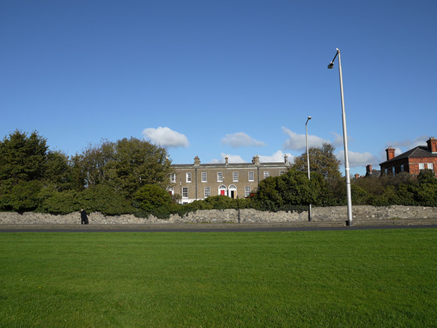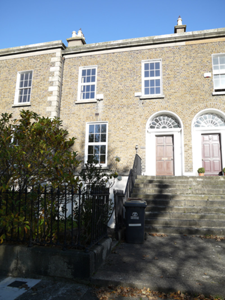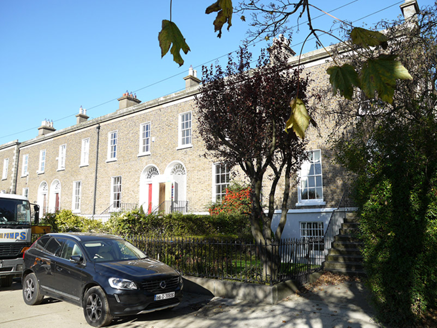Survey Data
Reg No
50030182
Rating
Regional
Categories of Special Interest
Architectural, Artistic
Original Use
House
In Use As
House
Date
1845 - 1850
Coordinates
319039, 236025
Date Recorded
05/11/2014
Date Updated
--/--/--
Description
Terraced two-bay two-storey house over raised basement, built 1847, having two-storey return to rear. Pitched M-profile natural slate roof with parapet to front elevation having cut granite platband and cornice, smooth rendered chimneystacks with cornice and clay chimneypots, and cast-iron rainwater goods. Brown brick laid in Flemish bond to front elevation having cut granite stringcourse over smooth rendered wall to basement level. Square-headed window openings with cut granite sills and replacement uPVC windows. Round-headed door opening having petal motif fanlight, door surround with cornice and frieze supported by console brackets and timber panelled door. Cut granite entrance steps and platform having cast-iron balustrade. Set back from road and having cast-iron railings on cut granite plinth wall, and cast-iron pedestrian gate. Situated off Clontarf Road facing shared enclosed green. Associated former gate lodge to west. Two-bay single-storey outbuilding to rear with half dormer attics, pitched natural slate roofs, roughcast rendered and rubble stone walls and recent single-storey extensions.
Appraisal
This house is part of a substantial terrace that retains its early form and character. Historic fabric remains to the entrance platforms, door surrounds and railings. Together with its outbuildings, the gate lodge and the shared green, this house and its grouping forms a largely intact example of large-scale mid-nineteenth-century housing development. The terrace was built in 1847 by Isaac Warren, a steward of the Vernon estate, on ground obtained from that estate. The raised entrance provides views of the seafront, a characteristic that became desirable in the mid-nineteenth century, while the shared green gives privacy from the thoroughfare of Clontarf Road. The seafront developed in irregular terracing and was designated Clontarf Road in 1912.





